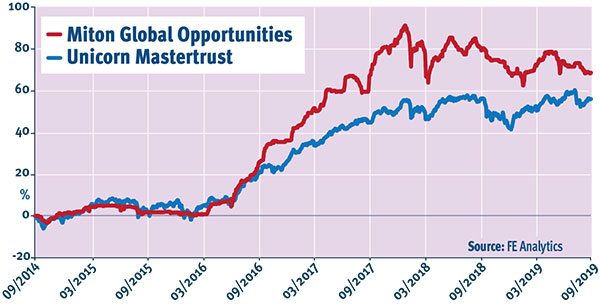How two professional investors find investment trust bargains
We compare strategy, performance and charges of two fund-of-investment trust managers.
14th November 2019 10:00
by Cherry Reynard from interactive investor
We put two fund-of-investment trust managers through their paces, comparing strategy, performance and charges.

Funds of investment trusts occupy an unusual place in the investment universe: it is usually relatively sophisticated investors who appreciate the charms of investment trusts, but those same investors are often active investors, in a position to select investment trusts themselves. Therefore, the fund of investment trusts must offer a little more.
There are two main funds in this area: Miton Global Opportunities (LSE:MIGO), a closed-ended fund of investment trusts run by Nick Greenwood; and Unicorn Mastertrust, an open-ended fund run by Peter Walls. Both fund managers recognise that they need to take a 'Heineken' approach – reaching the parts of the investment trust market that others can't, rather than simply offering curated access to, say, Scottish Mortgage (LSE:SMT) or Finsbury Growth & Income (LSE:FGT).
Access to what they can't buy themselves
Greenwood says: "Nick Train is a great investor, but everyone knows about him. Our investors are already investment trust investors; they want stuff they can't buy themselves – perhaps for liquidity or risk reasons." Walls agrees; he too largely eschews mainstream trusts because his investors can make their own minds up on those, instead focusing on more specialist areas. He adds:
"This fund is for someone who understands the attractions of investment trusts, but hasn't got time to deal with the complexities – discounts, liquidity and so on."
However, while the two funds are optically quite similar – to the extent that each has a capital growth target and invests solely in the investment trust sector – the managers have distinct approaches.
Walls is clear that he wants to pick the best managers in the investment company sector, taking advantage of the structure where possible: “Investment trusts provide permanent, committed capital, meaning an investment trust manager can take a longer-term view. We will evaluate a manager's process and look at alignment of interests.
"While we are well-diversified by company and sector, we tend to have a bias in certain sectors, notably funds invested in less liquid underlying investments where there is greater risk but greater reward – smaller companies, either in the UK or overseas, or private equity, for example."
He trades infrequently to keep broker fees to a minimum, and characterises his style as contrarian. "In reality, I'm forced to be a contrarian. When a trust performs well, the discount narrows, more people want to buy it. That process works in the opposite direction as well: if a manager has mis-steps, the more the discount widens, the more people sell. This process forces us to recycle capital into areas where the discount widens and vice versa," says Walls.
Two funds of trusts: contrarian v thematic

Sensitive to discounts and premia
In this way, he is sensitive to discounts and premia. In general, he won't buy trusts trading on a premium to net asset value; he would rather wait. He admits that while occasionally he will miss out, he is "just not interested in paying more than something is intrinsically worth." Walls also likes to see a catalyst. He gives the example of BlackRock World Mining Trust (LSE:BRWM). It had a royalty that went awry in 2014. The company was forced to cut the dividend and the discount ballooned out.
Having met with manager Evy Hambro and talked about the way the commodity majors had been cutting down on investment, he saw a potential opportunity. The trust had already suffered with the dividend cut and there was some visibility on the dividends: "For us, there were lots of green lights."
Greenwood's approach is more thematic. A good example of how this works in practice is the fund's current position in micro-caps. "There has been a post-Woodford witch-hunt on anything small, particularly in the sub- £200 million bracket," he says. "The average discount in trusts investing in this part of the market has moved from around 18% to 23%. As fund management groups consolidate and funds get larger, investments in small companies don't move the dial. As a result, the buyer for smaller companies just isn't there. It doesn't help that they are perceived as domestic and have taken the brunt of Brexit worries."
This has left the sector unloved, but that wouldn't necessarily be a buying opportunity in itself. In general, he won't buy anything where he is negative on the prospects for net asset value growth in the trust:
"I like arbitraging between perception and reality. Discounts run on perception."
Of course, there are exceptions. The discount on the Macau Property Opportunities (LSE:MPO), for example, in his view overplays the negative outlook for its net asset value. At the same time, he doesn't rule out buying on a premium completely – there will be times when the net asset value is wrong and is far higher than currently suggested by the market. This is particularly true for assets such as private equity or infrastructure, which only price once or twice a year.
Positive message on smaller companies
However, with his micro-cap theme, Greenwood was getting a more positive message from investment trust managers. At a recent meeting with River and Mercantile (LSE:RIV), for example, the group pointed out that the average company in the sub-£400 million category was trading at a price-to-earnings ratio of 8 times or less.
With the trusts and the shares themselves on a discount, the potential is there for appreciation in both the underlying assets and the share price of the trust, which to Greenwood's mind is the real advantage of investment trusts. He is currently buying a basket of micro-cap trusts.
Greenwood is also willing to take the occasional macroeconomic position, as seen in his current positioning on India: "It should be a beneficiary of the US-China trade war. Listed stocks should benefit from a shift to the formal economy, yet at the moment, the trusts are on a 20% discount because everyone hates it."
The verdict on the two bargain-hunting investors
The two portfolios are quite different. The Miton fund is an eclectic mix – VinaCapital Vietnam Opportunity (LSE:VOF) and India Capital Growth (LSE:IGC) sit alongside Dunedin Enterprise Investment Trust (LSE:DNE) and Phoenix Spree Deutschland (LSE:PSDL) in the top 10 holdings; while the Unicorn fund has some more recognisable names, including HarbourVest Private Equity (LSE:HVPE), TR Property (LSE:TRY) and Aberforth Smaller Companies (LSE:ASL).
The difference in approach is also reflected in performance. Miton Global Opportunities has delivered stronger returns over five years, but it has been a high-octane ride for investors. The trust is up 39% over three years and 68.5% over five years. Recent performance has been rockier, with the trust down 7.1% in the 12 months to mid-September this year. Three-year volatility currently sits at 11.6%, though some of this will be the result of the investment trust structure. The ongoing charge figure (OCF) is currently 1.4%.
Unicorn Mastertrust provides a gentler ride – it is up 55.9% over five years, 32.6% over three years and 0.9% over one year. The fund is open-ended so there's no discount or premium to worry about,and three-year volatility is 8.1%, with an OCF of 0.84%.
Neither fund participates extensively in new IPOs. Walls believes they tend to come to market when the underlying assets have already done well, and often disappoint. While both funds have pivoted to some extent towards alternatives as the investment trust sector has shifted, neither has sought to become a fund of alternatives or to focus on the more eccentric elements in the sector.
Both funds will reach those parts of the investment trust market that investors can't reach themselves, but each reaches slightly different bits. The right option will be down to investor taste.
Full performance can be found on the company or index summary page on the interactive investor website. Simply click on the company's or index name highlighted in the article.
This article was originally published in our sister magazine Money Observer, which ceased publication in August 2020.
These articles are provided for information purposes only. Occasionally, an opinion about whether to buy or sell a specific investment may be provided by third parties. The content is not intended to be a personal recommendation to buy or sell any financial instrument or product, or to adopt any investment strategy as it is not provided based on an assessment of your investing knowledge and experience, your financial situation or your investment objectives. The value of your investments, and the income derived from them, may go down as well as up. You may not get back all the money that you invest. The investments referred to in this article may not be suitable for all investors, and if in doubt, an investor should seek advice from a qualified investment adviser.
Full performance can be found on the company or index summary page on the interactive investor website. Simply click on the company's or index name highlighted in the article.
These articles are provided for information purposes only. Occasionally, an opinion about whether to buy or sell a specific investment may be provided by third parties. The content is not intended to be a personal recommendation to buy or sell any financial instrument or product, or to adopt any investment strategy as it is not provided based on an assessment of your investing knowledge and experience, your financial situation or your investment objectives. The value of your investments, and the income derived from them, may go down as well as up. You may not get back all the money that you invest. The investments referred to in this article may not be suitable for all investors, and if in doubt, an investor should seek advice from a qualified investment adviser.
Full performance can be found on the company or index summary page on the interactive investor website. Simply click on the company's or index name highlighted in the article.